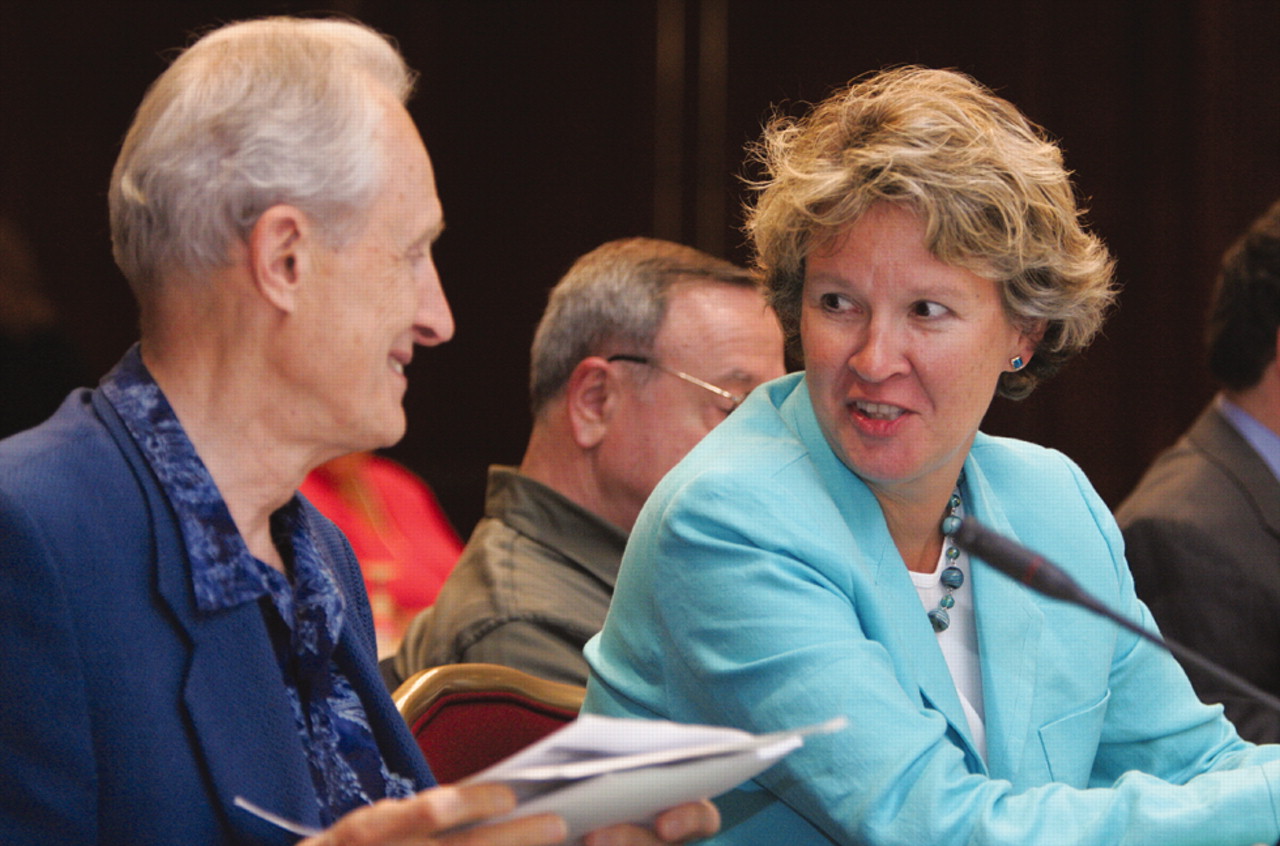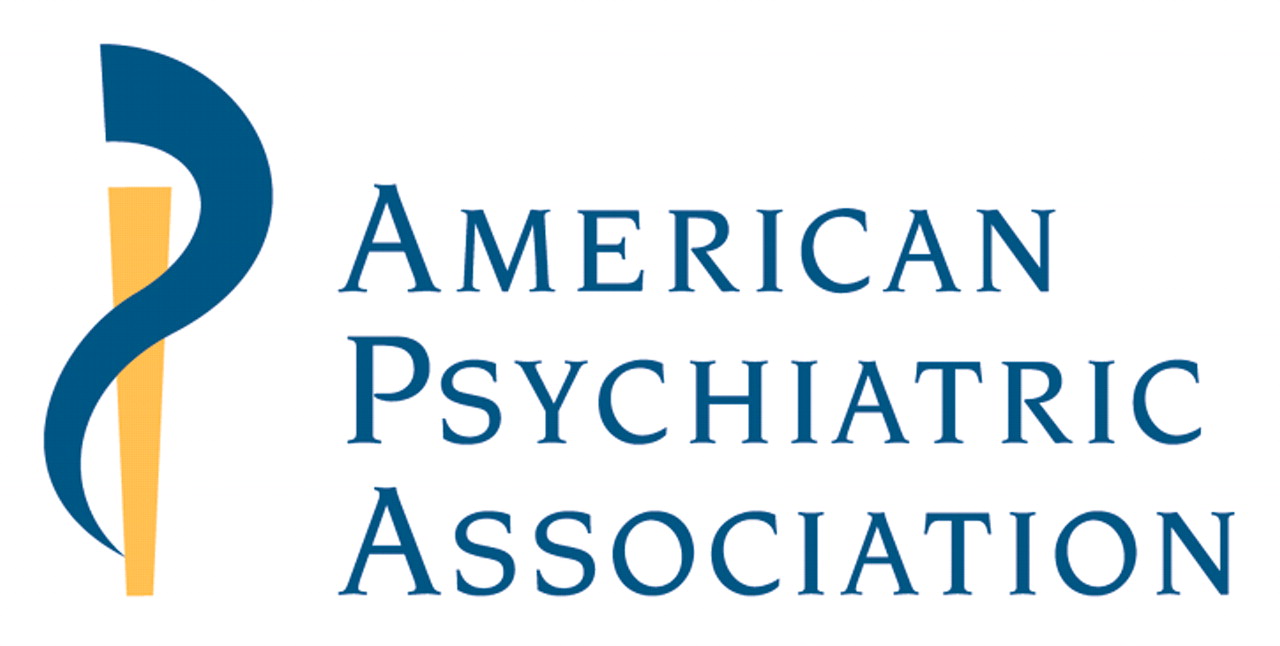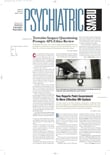The APA Board of Trustees took a historic step at its July meeting when it made APA the first medical specialty society to support legal recognition of same-sex civil marriage.
Such a position statement had been endorsed by the Assembly at its May meeting in Atlanta (Psychiatric News, June 17). It expands APA's existing position in support of same-sex civil unions and emphasizes the mental health consequences of denying same-sex couples the same legal rights as their heterosexual counterparts. The legal rights to which these couples do not have access can include visiting an ill partner in the hospital, making health care decisions for a disabled partner, financial and retirement planning to prepare for emergencies or a financially secure future, and, in the case of parents, being able to raise a child when the biological parent is unable.
The statement, which applies to civil and not religious marriage, notes that same-sex couples “experience several kinds of state-sanctioned discrimination that can adversely affect the stability of their relationships and their mental health.” It also points out that “there is ample evidence that long-term spousal and family support enhances physical and mental health at all stages of development.”
The position statement passed with 14 “yes” votes, one“ no” vote, and two abstentions.
Area 6 Trustee Tom Ciesla, M.D., who supported the proposal, insisted that the issue is not discrimination, but tolerance. Despite the opposition that some members may register to the position statement, “supporting it is simply the right thing to do,” he said.
Former APA President Paul Fink, M.D., stressed that the“ social” component of the biopsychosocial approach to mental health to which APA is committed cannot be arbitrarily dismissed.
In explaining his opposition to the proposal, Member-in-Training Trustee Daniel Mamah, M.D., said that this is “a social issue that's weakly linked to mental health” in the research literature and is thus outside of psychiatrists' expertise. He noted that he was a supporter of the right of gay couples to marry.
Former APA President Paul Appelbaum, M.D., also maintained that APA should not take positions on such “divisive social issues,” particularly when its agenda includes pressing matters more directly related to mental health care. He abstained from voting, however, explaining that he did not want a “no” vote to be interpreted as signaling his opposition to same-sex marriage, which, in fact, he supports.
Auditors Give Favorable Report
The Trustees received a very favorable auditors' report on APA's finances for the two years ending December 31, 2004, and how the Association is managing them.
APA's balance-sheet ratio, including investments, shows that it has $1.72 in assets to cover each dollar of liability. The auditors said this ratio was stronger on average than that of other not-for-profit associations.
The chief auditor, Wayne Berson of the independent auditing firm BDO Seidman, said that overall it gave APA an “excellent report,” finding that, compared with similar associations, APA has “an extremely strong balance sheet” and that a very high percentage of its budget goes to program activities.
Other Board Actions
The Board of Trustees also deliberated on several other issues. It voted to
•
appoint a work group to review a proposal from the Assembly to give that body the right to override Board votes that ignore or overrule actions approved by the Assembly. This proposal would require an APA Bylaws change and apply only to issues without a fiduciary impact on APA. Seventy-five percent of Assembly members would have to vote in favor for an override of a Board action to be implemented. This work group, part of whose charge is to review the proposal's legal implications, will report back to the Board in October.
•
defeat a proposal to put APA on record in support of ending Medicaid's Institution for Mental Disease (IMD) exclusion. The rule bars federal Medicaid payments for adult inpatient psychiatric care in institutions with more than 16 beds if those facilities are primarily for psychiatric treatment, which thus exempts general hospital psychiatric units from the exclusion. There is concern that ending the exclusion would impose severe financial hardship on general hospital psychiatric units while it benefits large, specialized hospitals, which have lower costs than general hospital units. Others opposed to removing the exclusion noted that the effects are likely to vary by geographic region, and thus it might be more appropriate for some district branches rather than APA to take a position. Proponents of terminating the exclusion, however, viewed it as one more form of discrimination against people who need treatment for mental illness.
•
obtain feedback from Assembly members and APA members in general about adopting a new logo for APA. This was in response to a proposal to make the logo used in APA's Healthy Minds, Healthy Lives campaign the APA logo (see below). The logo is a stylized staff of Aesculepius, and the blue figure is a stylized letter “P” for psychiatry.
•
increase registration fees in all categories by 10 percent for the 2006 APA annual meeting in Toronto to compensate for the meeting's several years of steadily rising cost increases and to reduce dependence on industry financial support. Registration fees for most member categories have not been increased in three years. The increase means, for example, that most APA members will pay $220 to register for the 2006 annual meeting, compared with $200 for the 2005 annual meeting.
•
endorsed an APA position statement urging use of the concept of recovery in the care of adults with serious and persistent mental illness being treated in “community-based and other public-sector mental health systems.” It explains that the recovery concept promotes a“ resumption of normal development” and stresses “a person's capacity to have hope and lead a meaningful life and suggests that treatment can be guided by attention to life goals and ambitions.... It focuses on wellness and resilience and encourages patients to participate actively in their care, particularly by enabling them to help define the goals of psychopharmacologic and psychosocial treatments.”
In executive session, the Board voted to take action on the controversy concerning the Texas district branch and the establishment of two new psychiatric organizations in Texas (see box on
page 9).
Also in executive session, Trustees approved grant requests for activities related to scope-of-practice issues from the Alaska, Wyoming, and Illinois district branches.
The Board was also informed that prior to last month's meeting the Executive Committee agreed to sign on to amicus curiae briefs in three cases.
One case, Aiwohi v. Hawaii, involves that state's use of its manslaughter statute to prosecute a woman who used methamphetamine while she was pregnant. The state charges that her son died two days after he was born as a direct result of her drug use. The case is before the Hawaii Supreme Court, and APA signed onto a brief written by National Advocates for Pregnant Women. APA issued a position statement in March 2001 opposing prosecution of pregnant or newly delivered women on child abuse charges based solely on use of drugs during their pregnancy, pointing out that many women will shun treatment out of fear that they are risking arrest. The position statement is posted at<www.psych.org/edu/other_res/lib_archives/archives/200101.pdf>.
In Goodman v. Georgia and United States v. Georgia the key issue is whether prisons are required to comply with the Americans With Disabilities Act. The two cases argue a similar issue, and APA is concerned that disabled prisoners, including those with mental illnesses, are not being accommodated as the law mandates for public services.
Trustees also heard
Psychiatric News Editor in Chief James Krajeski, M.D., report on the results of a readership survey (see
page 8).
A draft summary of all the Board actions taken at its July meeting will be posted soon in the Members' Corner area of APA's Web site,<www.psych.org>.▪


